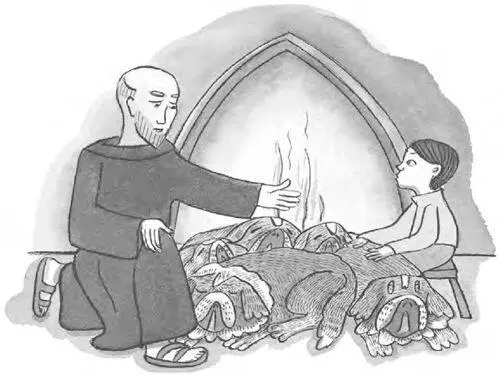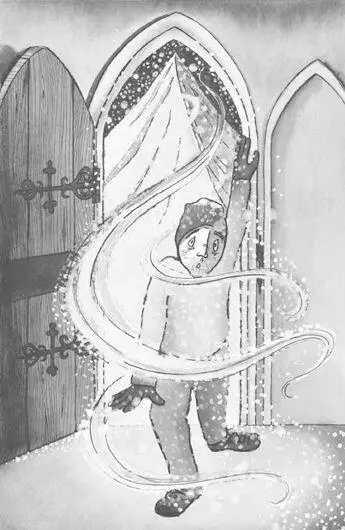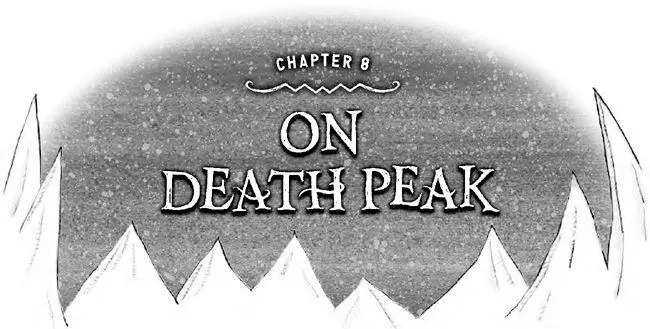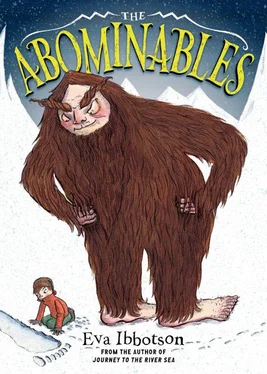Poor Leo, thought Con, looking up at the crags of Death Peak, where the rain that was now lashing their windscreen would, he knew, be falling as drifting, blinding snow. And he thought with a pang of homesickness of his own father, who might sometimes throw bags of flour but who never came up with idiot ideas like making a man of his son.
About three hundred feet below the top of the pass, Perry gave up. The lorry had started its chicken-with-the-croup noises, and though the windscreen wipers were working on the double, it was impossible to keep the windows clear of sleet. To try to make the descent down one of the most dangerous and winding roads in Europe in weather like that would have been madness, even with an empty lorry. As it was …
So he turned off into a deserted quarry, which ran off the curve of the road and provided some shelter. “We’ll have to spend the night here, I’m afraid,” he said.
The yetis, of course, loved the idea. “Isn’t it fresh , isn’t it bracing?” they said, and for an awful moment it looked as though Grandma would begin to yodel again.
But after a while, Con and Perry began to get worried about Ellen. It was bitterly cold at that height, and though they kept the windows tightly closed, the chill seeped right through their clothes and the thin army blanket that was all they had for covering. Ellen never complained, but she was a frail, slight child and now she had no way of hiding the whiteness of her face or the shivering fits that shook her.
“Listen,” said Perry to Con, “do you see that building up there, on Death Peak? On that rocky ledge?”
Con nodded.
“It’s a monastery. The monks that run it are great people — they’re always helping travelers in trouble. They train St. Bernards, too — those mountain rescue dogs. You can reach it in half an hour and the path’s perfectly safe.”
“You mean I should take Ellen up there and ask if we can spend the night?”
“That’s right. But go now, quickly. You’ve only another hour till dark.”
“But what about the yetis?” said Con.
“I’ll look after them. They’ll be all right, I promise.”
Con threw another glance at Ellen, huddled in the corner of the cab and trying to stop her teeth from chattering. “All right,” he said.
An hour later, safe from the storm, the children were sitting over steaming bowls of soup and hunks of fresh-baked bread in the monastery dining hall.
It was a beautiful room. Candles burned on the long wooden table; there were heavy carved oak settles and a blazing fire of pine logs in which the resin bubbled and sang.
But Con and Ellen couldn’t take their eyes from what was lying in a huge, warm huddle of feet and melting eyes and thumping tails across the hearth. Five dogs. Five of the most beautiful dogs they had ever seen: white and brown; gold and liver-colored; fawn and mahogany; all with wrinkled foreheads and slobbery jowls. The famous St. Bernards of Feldenberg.
And while the children ate their soup, the friendly monks, clustering round, told them — in a jumble of languages — the story of the dogs.
For a long time, they explained, people had stopped using dogs for mountain rescue work because they were so expensive to train and modern devices like helicopters and radar seemed to make them unnecessary. But a very rich and kind American, an oil millionaire from Texas who had come to Feldenberg for a holiday, had been so upset to think that those wonderful dogs were no longer bred and trained that he had sent the monks a litter of five of the most highly bred St. Bernards in America— and given the monastery a huge sum of money to be used each year for the feeding and training of the dogs.
“How marvelous!” said Con, scratching the ear of an enormous white-and-liver-colored brute who had fallen asleep across his feet. “And have they rescued anyone yet?”
The monks looked at each other and said no. Fortunately, Death Peak was a very dangerous mountain that people treated with respect, so nobody had needed rescuing. A silence fell. And then, suddenly, perhaps because Con and Ellen had very listening faces, it all came out.

The dogs, said Brother Peter (and all the others nodded to show that they agreed with him), were the most charming, gentle animals that anyone could wish for. The monks adored them; they couldn’t bear to think of life without them. There was only one snag. They were absolutely useless at rescuing anyone from anything.
The children found this almost impossible to believe.
“But I thought … all St. Bernards …” stammered Con.
The monks shook their heads and sighed. Most, perhaps, but not all. Certainly not Baker or Brutus or Biscuit and quite definitely not Bouncer or Beelzebub.
And one by one, kind Brother Peter, who was in charge of the kennels, introduced the dogs and explained their little troubles.
Baker, it seemed, suffered from chilblains — nasty big pink lumps that came up as soon as he set foot in the snow. Brutus, on the other hand, couldn’t stand heights. They had lifted Brutus onto a table once to have his toenails cut and he had very nearly fainted. Biscuit was terrified of the dark and had to have a night-light in his kennel. Bouncer, a real bruiser of a dog whose muscles beneath his brindled fur rippled like steel, cried like a baby when he had to get his feet wet.
“But that one?” said Ellen. “That huge dark one over there?”
The monks blushed. What was wrong with Beelzebub seemed to be a little different. Then, very shyly, Brother Peter leaned forward and whispered: “He drinks.”
And he explained that every St. Bernard was sent off with a keg of brandy round his neck so that when the lost traveler was found he could have a healing sip. Beelzebub, however, was driven so mad by the smell of brandy that he simply shattered the keg against the first rock he could find, lapped up the contents, and had to be carried home and put to bed.
And because the monks were good and honest men, they had decided that it wasn’t fair to go on deceiving the people of Feldenberg and taking the American’s money, so they had decided to send the dogs away the very next day. “But it will be like giving away our children,” said Brother Peter, and all the monks looked so sad that for a moment, Con and Ellen, used as they were to yetis, expected them all to burst into tears.

“But if no one ever needs rescuing,” said Ellen, who couldn’t bear anyone to be unhappy, “what does it matter?”
What happened next was just like in a play or a film. There was a violent pounding on the door and a man stumbled forward into the room. He was dressed in climbing clothes, his face was badly cut and bruised, and his leg dragged as he came forward.
“Help! I must have help quickly! It’s my son, my little Leo. He’s lost on Death Peak. Send out the dogs to save him! Please … quickly … send out … the dogs,” said Mr. Letts — and Brother Peter was just in time to catch him as he fell.

 HE MONKS PUT OUT THE DOGS. WHAT ELSEcould they do? They pushed out Biscuit, howling because of the terrifying darkness, and Baker, trying to keep his chilblained feet out of the snow. They pushed out Brutus, who got giddy on a kitchen table, and the whimpering Bouncer and boozy Beelzebub with his barrel …
HE MONKS PUT OUT THE DOGS. WHAT ELSEcould they do? They pushed out Biscuit, howling because of the terrifying darkness, and Baker, trying to keep his chilblained feet out of the snow. They pushed out Brutus, who got giddy on a kitchen table, and the whimpering Bouncer and boozy Beelzebub with his barrel …
Читать дальше




 HE MONKS PUT OUT THE DOGS. WHAT ELSEcould they do? They pushed out Biscuit, howling because of the terrifying darkness, and Baker, trying to keep his chilblained feet out of the snow. They pushed out Brutus, who got giddy on a kitchen table, and the whimpering Bouncer and boozy Beelzebub with his barrel …
HE MONKS PUT OUT THE DOGS. WHAT ELSEcould they do? They pushed out Biscuit, howling because of the terrifying darkness, and Baker, trying to keep his chilblained feet out of the snow. They pushed out Brutus, who got giddy on a kitchen table, and the whimpering Bouncer and boozy Beelzebub with his barrel …










